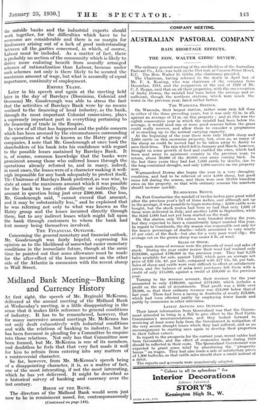SOME CAUSES OF DEPRESSION.
At the same time, the chairman of Barclays Bank pointed out that while in many instances banking aid which has been given has been justified by results, it has been proved in other cases that it was not financial assistance that was required so much as reorganization to meet the ever increasing competition. Industry, in fact, in many directions is called upon to reorganize itself and Mr. Goodenough is not only justified, but is to be commended for definitely stating that while provision of capital is of little value unless a business is sufficiently organized and controlled, such reorganization does not in the first instance lie within the province of the banks. In many instances where a business fails to make progress it may be found, said the chairman of Barclays Bank, that the primary reason is not a shortage of capital but the handicap of inefficiency as compared with other similar businesses either at home or abroad. When these defects, whatever they may be, have been adequately recognized and overcome, it is then that the banks can assist by helping to find the capital that is necessary for such reorganization, when a scheme has been carefully worked out by experts. For many reasons I am glad that Mr. Goodenough has given- this strong and helpful lead at the first of the Bank meetings with regard to the greatest need of industry. In particular, I am glad because it assuredly coincides with the views which must have actuated the Bank of England in taking the steps which it has taken to make itself thoroughly acquainted with and in touch with any schemes of rationalization which may be brought forward, and certainly Mr. Goodenough's views are also in accord with those of Sir Josiah Stamp, as expressed by him at a recent business gathering in Bradford. In this matter of rationalization of industry, it is of supreme importance that the Bank of England, (Continued an page 1434 the outside banks and the industrial experts should work together, for the difficulties which have to be overcome are considerable and there is no margin for hindrances arising out of a lack of good understanding between all the,parties concerned, in which, of course, Labour must be included. As a matter of fact, there is probably no section of the community which is likely to derive more enduring benefit from soundly arranged schemes of rationalization than Labour, because under such schemes not only is there likely to be secured the maximum amount of wage, but what is assuredly of equal importance, continuity of employment.







































 Previous page
Previous page